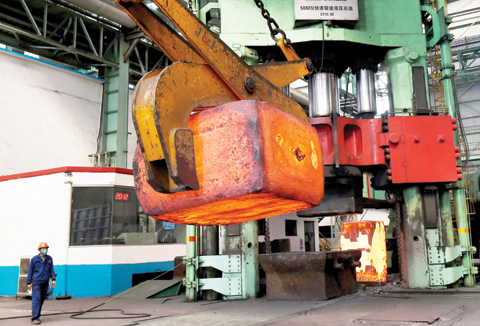Germany warns protectionism is 'wrong path' for US
 ZOUPING: A Chinese employee walks past red hot steel at a steel plant in Zouping in China’s eastern Shandong province yesterday. — AFP
ZOUPING: A Chinese employee walks past red hot steel at a steel plant in Zouping in China’s eastern Shandong province yesterday. — AFPWASHINGTON: US President Donald Trump on Sunday signaled his intent to move forward with controversial tariffs on steel and aluminum imports that have sparked fears of a trade war. "We are on the losing side of almost all trade deals. Our friends and enemies have taken advantage of the US for many years. Our Steel and Aluminum industries are dead. Sorry, it's time for a change!" the president wrote on Twitter.
Earlier in the day, two Trump administration officials said the tariffs-25 percent on steel and 10 percent on aluminum-would likely not include exemptions for allies. "I know he's had conversations with a number of the world leaders," Commerce Secretary Wilbur Ross said on ABC's "This Week." "The decision, obviously, is his. But as of the moment, as far as I know, he's talking about a fairly broad brush." In a subsequent interview on NBC's "Meet the Press," Ross allowed for the possibility that Trump may yet change his mind, as he has on other issues.
"We shall see. We shall see. I know a lot of ministers from a lot of countries have been talking with the president. They have been talking with me. They have been talking with others. We'll see. The president makes the decisions," he said. Trump ignited fears of a trade war and an outcry from US trading partners when he abruptly announced plans for the tariffs.
British Prime Minister Theresa May said she raised her "deep concern" over the tariffs in a phone call with Trump on Sunday, her office said. The European Union has said it is drawing up measures against leading US brands like Harley-Davidson and Levi's jeans, while China warned it "won't sit idly by" if its interests are hurt.
A 'rounding error'
Canada, which has the most to lose as the top source of US steel and aluminum imports, has called the tariffs "unacceptable." Ross, who said he expected them to go into effect in the coming week, played down the potential impact economic impact of retaliatory measures.
"Sure there may well be some sort of retaliation, but the amounts that they're talking about are also pretty trivial. "It's some $3 billion of goods that the Europeans have threatened to put something on. Well, in our sized economy, that's a tiny, tiny fraction of one percent." "So while it might affect an individual producer for a little while, overall it's not going to be much more than a rounding error," he said. The move has been highly controversial among Republicans and within the administration, but Trump on Friday tweeted that "trade wars are good, and easy to win."
Peter Navarro, a top White House trade advisor, said the administration would consider exemptions on a case-by-case basis but "no country exclusions." "As soon as you start exempting countries you have to raise the tariffs on everybody else. As soon as you exempt one country, then you have to exempt another country and so it's a slippery slope," he said on CNN's "State of the Union."
German warning
The German government warned yesterday that a transatlantic trade war would harm both Europe and the US, urging Washington not to take a "wrong path" after a weekend of aggressive rhetoric.
"A trade war would not be in German, European or American interests," Chancellor Angela Merkel's spokesman Steffen Seibert told reporters in Berlin after President Donald Trump at the weekend threatened to impose tariffs on car imports from the European Union.
"Closing oneself off and protectionism are the wrong path," Seibert said. "Such measures would inflict pain on international trade flows and our industry, but above all hurt workers and consumers on both sides of the Atlantic."
French President Emmanuel Macron said yesterday that the European Union must "react quickly" to US plans for tariffs on steel and aluminum imports which he said clearly breached global trade rules.
"I believe it is important for the EU to react quickly, within the framework of the WTO (World Trade Organization) and in a balanced manner," Macron said at a press conference.
He was it "clear that these (tariffs) would go against WTO rules." US President Donald Trump has said he wants to set tariffs of 25 percent on steel and 10 percent on aluminum to protect US producers from what he calls unfair competition.
The plan has sparked an outcry among American allies such as Canada, the European Union, Mexico and Australia as well as China, the world's biggest steel producer. "Nationalism is a war where everyone loses," Macron said at a press conference with the visiting leader of Canadian province Quebec, Philippe Couillard. The European Commission has said it is drawing up retaliatory measures against leading US brands, such as Levi's jeans and Harley Davidson motorcycles. But Trump has shown little indication that he will back down, appearing to welcome the prospect of a trade war in a series of Twitter posts since last week.
"If the EU wants to further increase their already massive tariffs and barriers on US companies doing business there, we will simply apply a Tax on their Cars which freely pour into the US. They make it impossible for our cars (and more) to sell there. Big trade imbalance!" he tweeted on Saturday. Couillard also condemned Trump's proposed move, saying Quebec would be affected because of its large aluminum industry which produces about three million tons per year.
"But it's American consumers who are going to pay," Couillard said, referring to the increased prices of the metal for the end user. - AFP










